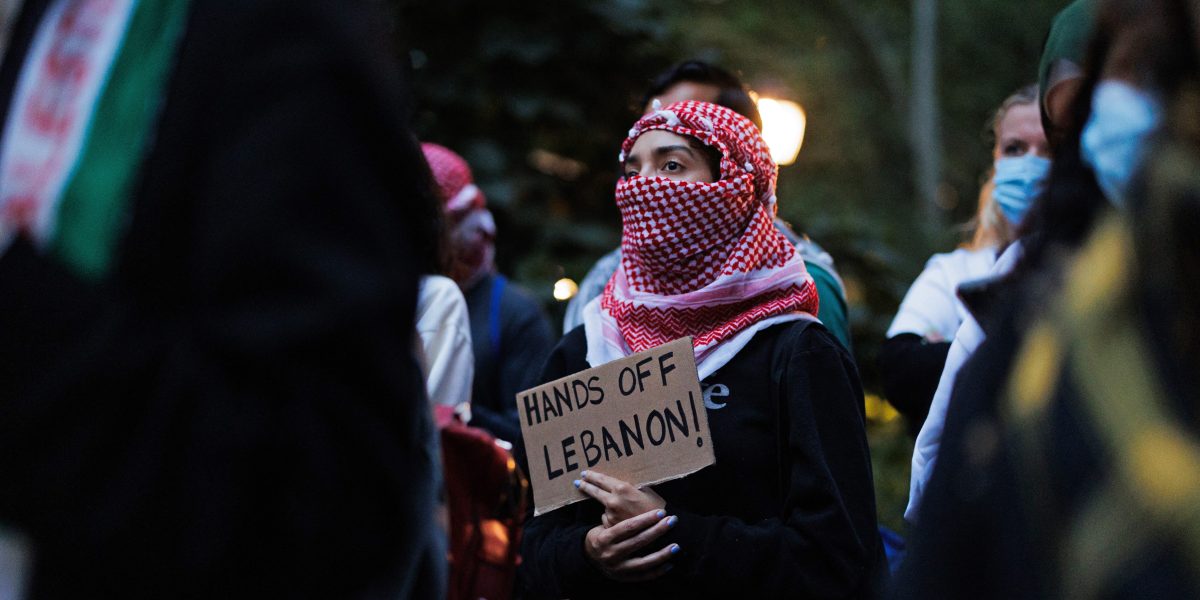Minutes after Missouri executed Marcellus “Khaliifah” Williams on Tuesday, his son, Marcellus Williams Jr., addressed a crowd of supporters that had gathered to grieve in front of the state prison in Bonne Terre.
Among them was Maha Odah, a Palestinian American activist with Al-Hadaf Kansas City, a Palestinian liberation organization, who had driven more than two hours to be there. When Williams Jr. began to grieve for his son’s stolen opportunity to know his grandfather, Odah thought of her own experience with loss.
In November, an Israeli airstrike killed Odah’s grandfather in Gaza. She had just seen him months before in August during a family trip, the first visit in a decade due to Israel’s policies that restrict movement in and out of the blockaded Palestinian territory. Months later, her aunt was killed during the Israeli siege of Nasser Hospital, while her aunt’s son, a surgeon at the hospital, remains imprisoned with his whereabouts unknown to her family.
“I saw a mirror,” Odah said, recalling moments spent with Williams’s family. “A reflection of these two systems that are both upheld by the U.S. that condemn Black and Palestinian men, our fathers, our grandfathers, and the rest of our families, at the mercy of those who continue to find ways to dehumanize us.”
Missouri killed Williams, who was 55 years old, for a murder he said he did not commit and even though prosecutors fought to throw his conviction out due to the paucity of the evidence. Gov. Mike Parsons declined to grant Williams clemency, and the U.S. Supreme Court declined to step in. His execution coincided with nationwide protests on Tuesday against Israel’s ongoing bombing campaign in Lebanon that has killed at least 615 people, including more than 50 children. News of the execution reverberated among protesters, who drew connections between Israel’s relentless U.S.-backed war on Gaza and state-sanctioned killing in the United States. In some places, demonstrators recited a poem Williams had written about Palestinian children.
For young people who have spent the better part of the last year protesting the war on Gaza, Williams’s case further reinforces their lack of agency in the face of state violence, said maya finoh, the political education and research manager at the Center for Constitutional Rights.
For young people who have spent the better part of the last year protesting the war on Gaza, Williams’s case further reinforces their lack of agency in the face of state violence.
The execution “lays bare the ways in which the criminal legal system is designed to still engage in Islamophobic anti-Black violence, and the ways in which the U.S. military-industrial complex’s empire is designed to further violence against Black and brown people abroad.”
“There’s not enough to prove that he did this crime. People are calling for what should be the stop of an execution, and the state still has the power to say, we don’t care,” finoh added. “Young people have been leading the vanguard of mass movement organizing over the past year. There has been this feeling of despair and hopelessness … in terms of, we should be able to have a say, this country says it’s a representative democracy, but it is not representing my interests or the interests of many, many people in this country.”
“They Don’t Care About Our Outrage”
In New York, Nerdeen Kiswani, founder of Within Our Lifetime, a Palestinian liberation group, said she learned of Williams’s killing while leading a march to the Israeli consulate in Manhattan. When it was her turn to speak, she also read Williams’s viral poem, “The Perplexing Smiles of the Children of Palestine,” sounding off each line as a call and response with the crowd: “In the face of apex arrogance/ and ethnic cleansing by any definition/ still your laughter can be heard/ and somehow you are able to smile/ O resilient Children of Palestine!” amid “daily terror” and “in the face of … ethnic cleansing.”
In closing, she referenced Williams’s last official statement before his execution: “All Praise Be To Allah In Every Situation!”
“When it comes to Black and brown people, the state has always executed its violence on our communities, and, of course, within the U.S., we see this play out the most when it comes to Black folks in particular, and then abroad, we’re seeing this in Lebanon, we’re seeing this in Palestine,” Kiswani, who is Palestinian, told The Intercept. “It feels like they don’t care about our outrage anymore. They know they can kill us in every corner of the world and get away with it, and so it’s our responsibility to fight for and stand up for each other.”
She said that throughout the marches she’s helped organize since October 7, she has seen many examples of solidarity between Palestinian and Black communities. An action at the Brooklyn Museum on Friday to push for the museum to divest from Israel, for example, drew participation from Black-led groups such as the Black Alliance for Peace and Equality for Flatbush. Kiswani noted that the solidarity goes back nearly a decade, when Palestinian American activists advised Black protesters in Ferguson on how to survive teargas sprayed by police, drawing on their experience from facing off with Israeli authorities in the West Bank.
Kiswani said such direct confrontations with law enforcement and state violence have helped activist groups see the intersections between their causes.
“A lot of folks in this generation — especially with all the protests that we’re seeing nationwide — people are directly interacting with the police state and are directly resisting it,” she said, mentioning the brutal arrest of fellow organizer Abdullah Akl, who was hospitalized after New York Police Department officers tackled him during the Tuesday march.
Williams’s killing was on the minds of organizers at other Palestinian and Lebanese solidarity marches on Tuesday.
In Los Angeles, while a coalition of Palestinian solidarity groups temporarily shut down Wilshire Boulevard, a main thoroughfare in the city, in front of the Israeli consulate, organizers spoke of Williams’s execution and read his poem on Gaza.
At a march against U.S. complicity in Israel’s bombing of Lebanon in front of the White House in Washington, D.C., one organizer led dozens of protesters in a chant, “Say his name: Marcellus Williams.”
During a pro-Palestine rally in Houston, Eyad El-Akoum, a local organizer who is Lebanese and Muslim, shared the news of Williams’s execution and invited protesters to say a prayer for him, mentioning Williams’s Muslim faith and role as an imam for those in his prison.
“I think about the interconnectedness of the Black struggle and Palestinian struggle and Lebanese struggle,” El-Akoum said at the rally, pointing to Israel’s common practice of incarcerating Palestinians indefinitely without charges, which has dramatically increased since October 7. “There are thousands of Palestinians that are sitting in Israeli prisons that have done nothing, that haven’t been charged with a crime, and the same fate can happen to them as it did Marcellus Williams.”
No Votes
Even as Williams’s execution has hit a nerve with young people, who could play a pivotal role in the upcoming elections, neither major party presidential candidate has released a statement about it.
“The reality is that silence in this precise moment feels like complicity.”
Rep. Delia Ramirez, D-Ill., said that the lack of response from Democratic Party leadership is concerning and that she plans to call on the White House to make an inquiry about the lack of an official statement.
“The reality is that silence in this precise moment feels like complicity,” she said, arguing that it pushes away voters the party desperately needs. “We’re here not because the people that I’m talking about are becoming Republicans. We are here because apathy in this precise moment is at its highest,” continued Ramirez, who was an early co-sponsor of a congressional resolution calling for a ceasefire in Gaza.
In addition to Williams’s execution and U.S. policy toward Israel, Ramirez pointed to the Democratic National Committee’s refusal to allow a Palestinian to speak on the main stage of the convention in Chicago last month, as well as a recent smear campaign against Rep. Rashida Tlaib, D-Mich., as factors that are creating apathy among voters.
“All of that has real consequences, Ramirez said, “and what it ends up becoming is a no vote, which to me, is even far more dangerous.”
“We’re clearly seeing that some people’s lives, some people’s futures — their security, their liberty, their humanity — are far more valuable than others. I mean, there is a dehumanization of Black and brown Americans in this country, and it’s been allowed to persist, and often it’s actually been perpetrated by the same institutions of our nation who are supposed to be fighting for justice, for our rights. They’re erasing us, they’re making excuses, and they’re harming people,” said Ramirez. “And I think it’s because if they don’t see us as humans, then you’re really not hurting us, right? If you don’t see the right to protect ourselves, if you don’t see us as humans, there’s no remorse.”
Rep. Cori Bush, D-Mo., echoed her colleague’s point, noting that President Joe Biden did not deliver on his 2020 campaign pledge to abolish the death penalty and that Democrats recently dropped opposition to capital punishment from their party platform. And in the case of Gaza, Bush said, the administration has escalated the conflict.
“For young people especially, these injustices feel personal,” wrote Bush in a statement to The Intercept. “They’ve been raised with the belief that killing innocent people is unequivocally wrong. But as they grow older, they’re faced with the harsh reality that those in power often make exceptions — whether through capital punishment or war, and oftentimes based on racism and prejudice. This hypocrisy is what fuels the anger and sense of responsibility to stand up against such injustices that we are seeing right now.”
That passion was palpable among those gathered in Bush’s home state on Tuesday. Before heading to the Missouri state prison, 25-year-old Odah had joined more than 100 other protesters who marched to Parson’s office in Jefferson City, each carrying a stack of signed petitions, calling to halt Williams’s execution. In all, the group gathered 1.5 million signatures, Odah said.
For the past month, she had been gathering signatures for the petition and emailing and calling Parson’s office to advocate for Williams. Eventually, the office stopped answering the phone. “It was super familiar: It’s the same dehumanizing and denial of existence that politicians and institutions project onto Palestinians. I know that all too well,” Odah said.
Odah began organizing with Al-Hadaf Kansas City in 2021 amid Israel’s bombing of Gaza and ongoing protests against the displacement of Palestinian families from the East Jerusalem neighborhood of Sheikh Jarrah. She said her own activism for Palestinian liberation and the deep history of solidarity with movements for Black liberation moved her to join the protest at the Capitol.
“It’s because our communities know what state violence looks like,” Odah said. “It’s because the state is built to maintain itself using death row, the police, and the bombs made in our backyards, because our communities are the victims of the same forces and brutality that trains them to put knees on necks, because our communities know what displacement looks like, from redlining and gentrification to ethnic cleansing. Our communities are not priorities to the systems of white supremacy. It’s horrifically familiar.”
The post Marcellus Williams Execution Enrages Palestine Solidarity Protesters appeared first on Patabook News .

